AmRen 2018: The Fire Taking Hold
Gregory Hood, American Renaissance, April 30, 2018

The Sixteenth Annual American Renaissance Conference was arguably the most important so far. In many ways, it is the best of times and the worst of times. More people than ever are joining our cause, and science reveals new findings that support us almost every week. Across the West, there is a palpable sense of white people awakening to their identity and destiny. At the same time, we face unprecedented repression. Before this conference, masked extremists vowed this would be the “last” American Renaissance conference, hostile journalists were sharpening their knives, and powerful technology companies continued to deplatform us.
The American Renaissance conference had to succeed. And it did.
Over 250 people gathered at the beautiful inn at Montgomery Bell State Park to hear from an exciting group of speakers. Though antifa promised to “smash” the conference, police and park rangers had clearly learned from the mistakes of Charlottesville. Courteous and professional officers kept antifa well away from us, and there were no confrontations. Anyone who stayed inside the conference center could barely even see, let alone hear, the 30 or so protesters. Police and park rangers set objective rules to allow both our guests and our opponents to exercise their First Amendment rights in the best traditions of our country. We are deeply grateful to the state of Tennessee for protecting the conference while enabling protesters to express themselves peacefully.
There were foreign press and two documentary crews at the conference, but we kept out dishonest, flagrantly hostile media. Both Huffington Post and Vice wanted to cover the conference, but they can be counted on to slant their coverage to the point that the event would be unrecognizable, and — even worse — they have doxed people. Audience security comes first.
This conference showed a striking unity of theme throughout the weekend, as speaker after speaker emphasized the need to learn from mistakes and build on the incredible opportunities of the present. In his introductory remarks Friday night, Jared Taylor referred to a “fire taking hold” — the increasing willingness of white people worldwide finally to take their own side and defend their interests. Fresh from several speaking engagements in Europe, Mr. Taylor reported unprecedented progress for our movement globally. He admitted that for the first two decades of his career in white advocacy, he sometimes wondered if he should never have taken that path; it seemed as though nothing was happening. However, the last five years have made it worthwhile, as more and more high caliber people are awakening to their duty. Both our supporters and our adversaries sense something has been set in motion that cannot be stopped.
On Saturday morning, the conference began in earnest with Professor Douglas Whitman of Illinois State University, who spoke about “Amazing Racial Differences.” His fascinating presentation showcased the incredible diversity of human populations around the world, showing how different groups evolved different biological characteristics in response to their environment.
Some of these adaptations are almost like superpowers. The original inhabitants of Tierra del Fuego, the frigid region at the tip of South America, showed remarkable resistance to bitter cold. European explorers (including Charles Darwin) were astonished at how the Fuegians worked and slept nearly naked in a harsh environment, while whites shivered in heavy furs huddled around fires. “These are tough, tough, tough people, highly physically and physiologically adapted to their environment,” Professor Whitman explained. “If you don’t believe in racial differences, I’d like you to do this: Next winter, take off all your clothes, and go sleep outside.”
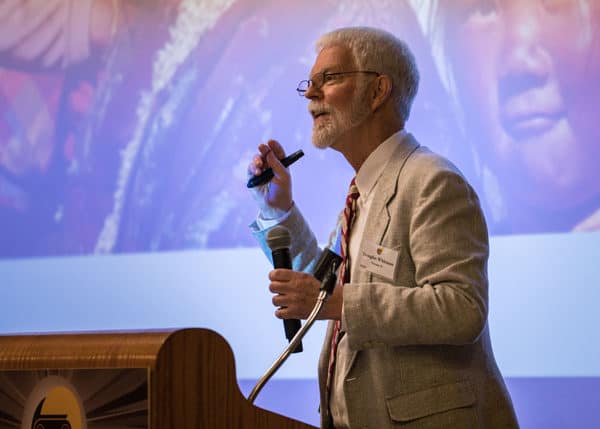
Douglas Whitman
Professor Whitman also described his “all time favorite” population, the Bajour of the Philippines (sometimes known as “sea gypsies”), a nomadic population with genetic adaptations that allow them to hold their breath as long as 13 minutes. Other groups show similarly remarkable traits suited to their environment.
European populations have their own evolutionary adaptations, notably the ability to digest milk as adults, which meant that cows became a sustainable food source. This ability then sparked new practices, such as cheesemaking. Culture and evolution thus developed side by side. “Humans direct their own evolution,” Professor Whitman explained, with culture and evolution acting together to influence everything from technology and trades to art.
Professor Whitman noted that genetic change can proceed incredibly quickly. Many dog breeds, for example, have appeared only in the last 500 years. Yet while many people can accept the reality of dog breeds, they somehow believe people are exempt from evolution. “Race is real,” said Professor Whitman. “The different races are not equal, they have different traits, and it’s based on genes.” He emphasized that talking about “superiority” is misguided. “Each race has its own advantages and disadvantages,” he said. “Most races are superior on their home turf.” The group differences we all notice are inherent; we are simply recognizing reality.
The next speaker, Nick Fuentes, is a well-known online commentator and, at age 19, is the youngest person ever to speak at one of our conferences. Like others, he alluded to a “rough year” for white advocates, given the crackdown after the Unite the Right rally in Charlottesville last August, but noted that groups like American Renaissance provide stability in troubled times. Mr. Fuentes spoke on the provocative topic of “Generation Z: The Answer to the Boomer Problem.” He described how boomers set in motion many of the trends that have so harmed us. Drawing laughter, he made exceptions for a few Boomers, such as Jared Taylor and those in the audience.
Mr. Fuentes then blamed Boomers for a litany of disasters: mass immigration, the pillaging of the American economy, the destruction of traditional institutions, and annoying online behavior. They reply to Facebook posts in all capital letters and use outdated memes. Though he conceded that they are, like everyone, slaves to history in some respects, he identified three major trends Boomers set in motion.
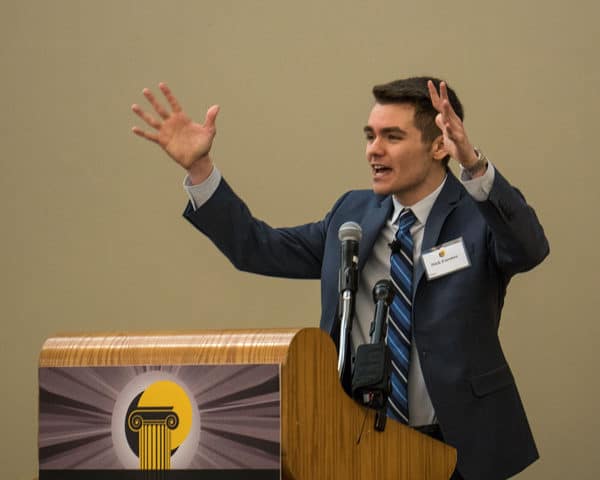
Nick Fuentes
The first was the destruction of racial identity. Most people mark the beginning of America’s racial disaster with the 1965 Immigration Act, but the real spike in Third World migration took place well after the bill was passed. Mr. Fuentes argued that real defeat came with the Culture Wars of the 1990s. Despite repeated referendums showing opposition to multiculturalism and mass immigration, government and corporate America still forced through sweeping cultural transformation. Boomers, said Mr. Fuentes, “fell asleep at the wheel” on immigration and fell for the lie that race is just skin deep.
Boomers also let go of the nation, which Mr. Fuentes distinguished from both race and state. Citing Robert Putnam’s book Bowling Alone, he said Boomers failed in their stewardship of the nation, as civic organizations collapsed and communities atomized. Similarly, he said Boomers promoted a culture of selfishness and a search for pleasure rather than building institutions and families. “At the end of the day, a society is only as strong as its families,” he said.
The final problem with the Boomers, said Mr. Fuentes, was the abandonment of “spirit.” He described the decline of religion, the abandonment of racial identity, and the loss community as parts of the same process. He argued God is the nucleus of a society, the foundation for essential institutions. Mr. Fuentes argued the bedrock of European identity for centuries was Christianity, which supplied the courage to fight all enemies from the Muslims to godless Communism.
Mr. Fuentes said the younger generation must rebuild civilization, and suggested Generation Z could solve the Boomer problem — though he acknowledged such embarrassments as David Hogg and the “Tide Pod Challenge.” Mr. Fuentes cited surveys that show Generation Z is more churchgoing, more risk averse, and less enthusiastic about social liberalism than preceding generations. He also said a plurality of 48 percent of white Generation Z voters said they would have voted for Donald Trump, while only 11 percent would have supported Hillary Clinton. Most importantly, unlike Boomers, Generation Z has no experience of “real” racism, such as segregation. It is experiencing the dissonance between what it is told about race versus the reality of life in multiracial America. This dissonance is an opportunity, but not a guarantee of success.
Mr. Fuentes ended with a powerful call to action, saying that the destruction of traditional America is “evil, it is deliberate, it is by design.” He contrasted the cause of our people to the vague beliefs of the protesters outside, and said our people should be willing to give their lives for this cause, quoting Archbishop Fulton Sheen: “We need a Christ who will restore moral indignation, who will make us hate evil with a passionate intensity and love goodness to a point where we can drink death like water.”
British barrister Adrian Davies gave a speech called “Softly, Softly, Catchee Monkey: Optics, Ethics, and the Cause.” He was happy to note that the movement has grown enormously over the past decade, and that American Renaissance attendees are younger and more evenly divided among men and women. However, he acknowledged that in contrast to the gleeful anticipation of 2016, many activists are pessimistic. Mr. Davies suggested both the enthusiasm of the past and pessimism of the present are overstated; the world does not change overnight.
Instead, it is time for reflection and analysis. One major trend working to our advantage is that many people finally recognize the scale of demographic change, and white dispossession can no longer be dismissed. The political reaction is slow but real. The West now “perceives itself as under threat in a way that would have been all but inconceivable to the most prescient thinkers of a generation ago.”
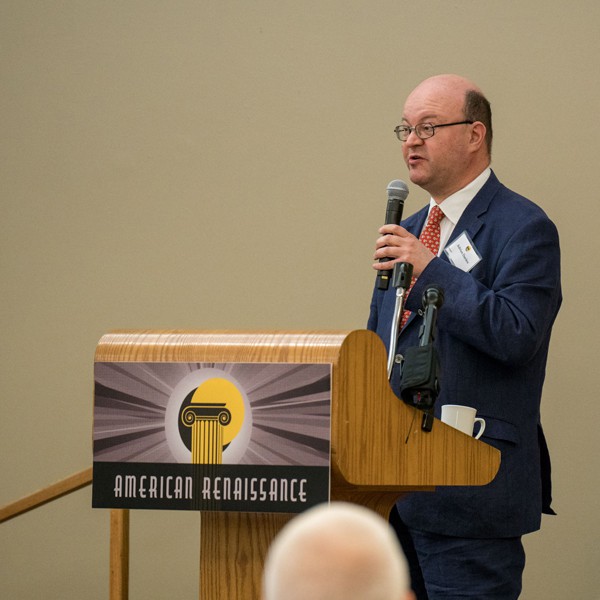
Adrian Davies
Unfortunately, the reaction may not be quick enough, and whites could suffer the fate of the American Indians or the Australian Aborigines. “If you don’t or can’t stand up for your interests, very, very bad things happen to you,” warned Mr. Davies. “That is the nature of human society and human history.”
Mr. Davies therefore argued that white advocates must think very seriously about how they present themselves. He acknowledged that in the “soft totalitarianism” in the West, there is no way to be involved in this cause without sacrifice. Like dissidents in Eastern Europe, we must accept the fact that many sympathizers are too intimidated to come forward, and white advocates must think very hard about whom to attract. “We need to inspire and win over the best people in our societies,” said Mr. Davies, “and we are not going to do that by behaving in a fashion that attracts only the mob.”
Mr. Davies warned against the “Marxist fallacy” that history will break our way without anyone taking action or making sacrifices. We must also not make excuses for flawed leaders simply because they have thrust themselves forward. He expressed amazement that white advocates seem to hold leaders to lower standards than those they set for themselves.
Mr. Davies denied that “all publicity is good publicity,” warning that any violence associated with our events will always be blamed on us. He noted that Identity Evropa seems to be taking the right approach. Mr. Davies closed by urging the audience to steel themselves for the task ahead. There are opportunities white advocates can seize, but only if they comport themselves in the best way possible.
Jared Taylor spoke about race relations as if they were a marriage, in a talk called “Irreconcilable Differences: We Need A Divorce.” Whites have made every possible effort to make the black/white marriage a success, he said: “There is, I’m sure, no project into which Americans have poured more moral energy than the idea of equal rights for blacks . . . . I don’t think in the history of the world any people has done so much mentally, psychologically, and in terms of material resources, to achieve equality for another group.” Yet, as Mr. Taylor observed, the easier things get for blacks, the more they seem to complain. Coddled blacks at Ivy League universities constantly seem to be finding “entrenched white supremacy.”
Mr. Taylor said the problem is assuming blacks and whites are equal and that any difference in achievement can be explained only by white racism. Thus, there is a never-ending search for the next great white racist because, without racists, how can we explain black failure? Yet each new villain — George Zimmerman, Darren Wilson, and now Starbucks manager Holly Hylton — does not seem to be very “racist” at all, but simply someone who made the mistake of trying to impose white standards on blacks.
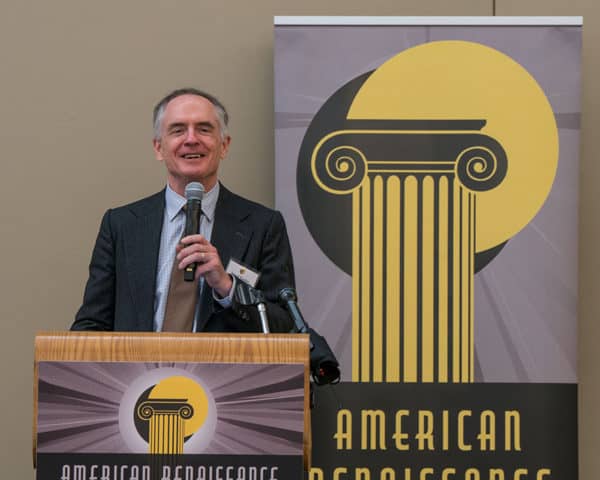
Jared Taylor
At the same time, blacks such as Chanelle Helm, Ta-Nehisi Coates, Ekow Yankah speak of us in openly spiteful terms, and as Mr. Taylor noted, this is happening while whites are still the majority. If whites become a minority, it will only be worse.
“There is a certain logic in what these people are doing,” said Mr. Taylor. “They want what we have,” and by demonizing us they justify taking it. Much more mystifying is that effect of multiracialism on whites. The attempt to make the “marriage” work seems to drive them literally crazy. They apologize for things they never did, they turn against innocent whites, and refuse to even to think about the misdeeds of non-whites. Mr. Taylor also gave several examples of standards of behavior whites established for themselves but that are being jettisoned because non-whites cannot or will not meet them.
Mr. Taylor suggested whites take non-white criticism literally. If we truly are as awful, evil, and oppressive as they say we are, they should be happy to separate. Obviously, non-whites still want whites around to look after them. However, Mr. Taylor said what is really needed is a change in perspective. Instead of always trying to appease non-whites and make them happy, Mr. Taylor said it is finally time for whites to start considering their own happiness. Our interests align perfectly with the logic of the current bitter critiques by non-whites of our behavior: Separation is the only solution.
Mr. Taylor concluded with a call to the audience: “You have a duty to ensure we have a future that is as bright and as promising as our past has been glorious,” he said. “This is our struggle. This is your struggle.” He also told the young people in the audience, “This will be your opportunity for greatness. Don’t let that opportunity pass you by.”
Well-known international commentator Serge Trifkovic spoke next on “Migratory Jihad and the Crisis of Europe.” He showed how Islam, from the beginning, spread by conquest and expansion. He also explained that Islam is a closed system, unlike Christianity, because it is without any spirit of inquiry. Dividing the world into the House of Islam and the House of War, Islam offers the world a simple choice: submission or war.
Europe has experienced great Muslim invasions in the past, from the occupation of Spain to the siege of Vienna. However, as Dr. Trifkovic observed, the third great invasion now underway may prove fatal. He argued Muslims in Europe already see themselves as a separate community opposed to the larger population of infidels. Worse, while those Muslims who first immigrated to Europe have a certain respect for the West because they remember colonial empires, Muslims born in Europe have only contempt for what they see as weak societies. Islam wants to keep them unassimilated. “The prime objective of the mullahs in the Islamic centers is to keep Muslim migrants apart from the host society,” he explained.
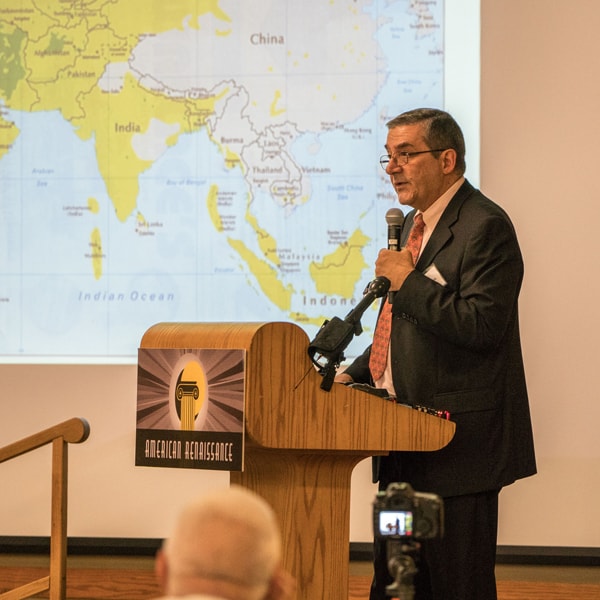
Serge Trifkovic
Dr. Trifkovic listed ways to stop the rise of Islam in America: border security, no more Muslim immigration, and profiling. Each of these steps has a basis in existing American law and precedent.
Ultimately however, overcoming Islam means overcoming the universalistic liberal view imposed on the West by an elite that feels no loyalty to any country. Unfortunately, unlike Communism in Eastern Europe during the Cold War, the attitudes of the governing class have been internalized by Western populations. Dr. Trifkovic urged us to act with a sense of urgency; otherwise, the West could face a collapse that is “rapid and terminal.”
“The Golden One,” Marcus Follin, told the audience that “The Defense of the West Begins With You.” Mr. Follin defined our aims: “to get our views — the radical notion that it’s OK to be white, the radical notion that we don’t want to be replaced in our own nations — into the mainstream.” No compromise is possible, because “it’s not about politics, it’s about survival.”
The Swedish YouTube commentator, MMA fighter, social commentator, and bodybuilder, urged us all to become the best versions of ourselves. If the media love to portray us in a certain way, he argued, it means we should be the exact opposite. By being the best versions of ourselves, we can lead by example and attract others, instead of being the caricature the media want. Ultimately, this will lead to a chain reaction as more and more people join the “quest for glory.”
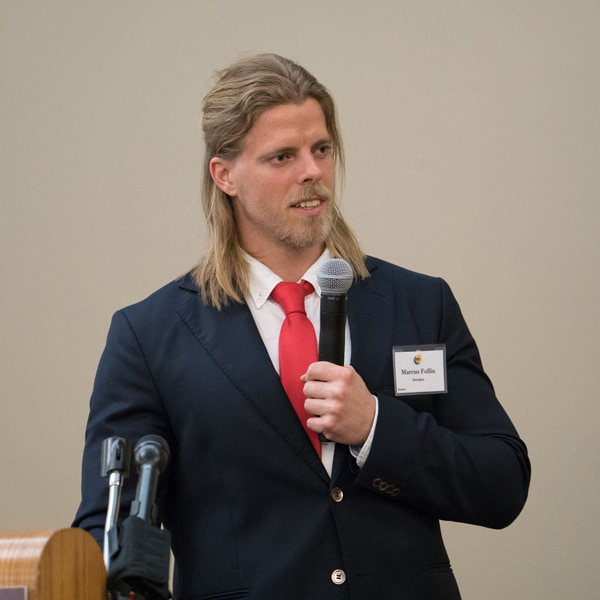
Marcus Follin
Mr. Follin proposed eight steps. We should always dress well, appropriately to the occasion. Second, we should be fit and pursue the ideal of a “healthy mind in a healthy body.” Third, we must be well-spoken and temperate. Fourth, we should reject the degeneracy of drug use, drunkenness, and pornography. Fifth, we should use the powerful weapon of humor. Sixth, echoing what other speakers said, it is important to set and enforce high standards; it is not acceptable simply to have correct beliefs. Seventh, Mr. Follin urged activists to maintain a high and uplifting level of culture, not simply because it is part of our cause but because it is a way to attract the best people. Finally, Mr. Follin said face-to-face networking is essential, especially as the current plague of deplatforming raises the possibility that we may not be able to use the internet much longer.
In the question period, John Derbyshire referred to Mr. Follin’s impressive physique and the precedent of another foreign bodybuilder who launched an American political career, and asked if Mr. Follin’s might run for Governor of California. Mr. Follin’s reply: “I’ll be back.” Jared Taylor concluded the day’s program by using one of Mr. Follin’s favorite words. “It’s been a glorious day,” he said.
The dinner speaker was Simon Roche of Suidlanders, which bills itself as the largest civil defense organization in the world, with the goal of defending white South Africans in the event of civil war — a disturbing possibility that seems increasingly likely. Mr. Roche noted several promising signs that white South Africans are showing increasing political consciousness: organizing boycotts and blocking roads to protest farm murders. In unity, counseled Mr. Roche, there is strength.
However, Mr. Roche’s primary message was a fiery challenge to whites around the world. He said whites should be proud of being a “special people” that can build wonders no other culture has yet matched. He urged Americans to “get off the couch” and “arise.” He acknowledged whites have been harmed by external enemies, but he demanded that whites accept responsibility for the crisis they face.
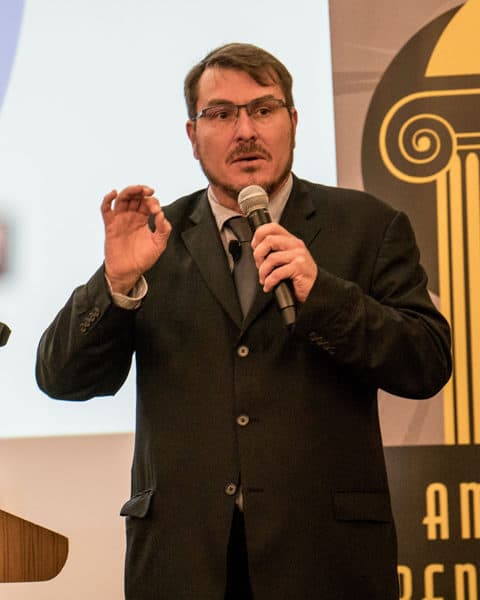
Simon Roche
“Put aside your differences and find the common denominator within your sacred culture,” Mr. Roche urged. He said whites must stop reveling in the glories of their past but to let past greatness inspire future deeds. “We have the capacity to stand for ourselves against an onslaught that is unprecedented in the history of the world,” he said, “but we must arise.” This call to unity and sacrifice was met with a standing ovation.
On Sunday morning, there were reports from allied organizations. Patrick Casey of Identity Evropa discussed his group’s goals. He emphasized strict recruitment standards, but pointed out that there are diverse roles for different people: old and young, public activists and private supporters. The group’s activities — leafleting college campuses, banner drops, honoring European-American heroes and victims of multiracial madness — continue to get nationwide headlines and draw new recruits. However, the group is also heavily involved in building up local networks and communities around the country, through which white advocates pool resources, find fellowship, and pursue common objectives. He received an enthusiastic reception, showing the high opinion many in the audience clearly have of this group.
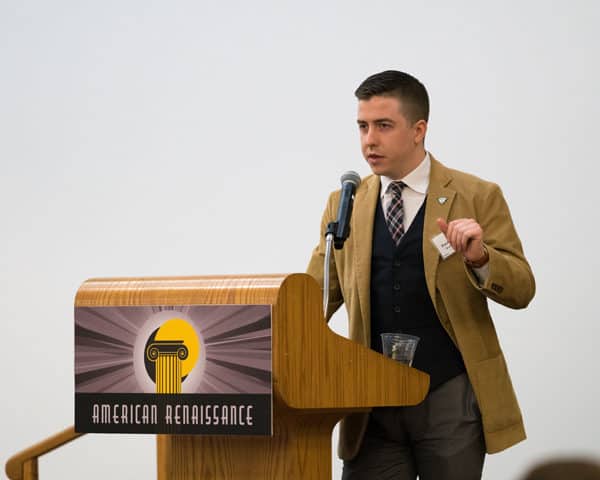
Patrick Casey
John Derbyshire, a past speaker at American Renaissance and a contributor at VDARE.com, read a letter on behalf of that organization by Lydia Brimelow. Mrs. Brimelow noted that both American Renaissance and VDARE.com have a proven record of accomplishment. VDARE.com can also claim credit for laying the ideological and policy framework for the populist, nationalist, and immigration-focused campaign that delivered Donald Trump the presidency.
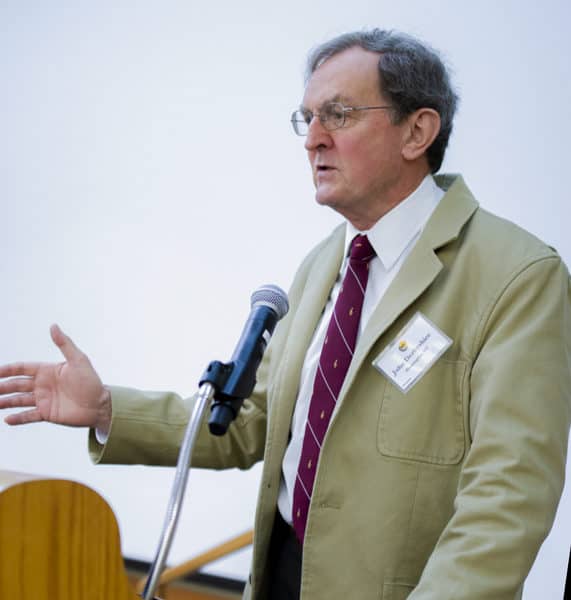
John Derbyshire
Mrs. Brimelow acknowledged the last year has seen increased repression against Dissident Right voices, even those like VDARE.com that had nothing to do with the rally in Charlottesville. In response, VDARE.com is pursuing three goals. First, retrieving the wounded. The site carefully covers the railroaded protesters from the Charlottesville rally, some of whom are still being held without bail. Second, VDARE.com promotes litigation to fight back against deplatforming and repression. Finally, it is working with allies to build “the home front” and establish local networks. And all the while, it publishes must-read content for anyone who thinks seriously about immigration policy.
Greg Johnson of Counter Currents spoke about his website and his upcoming projects. He described Counter-Currents as targeted at his past, younger self, providing the information he wishes he had known before he became involved in white advocacy. He noted that the audience of Counter-Currents spends a long time on the website and that smart, intelligent, and eventually influential young people have now spent years absorbing the cutting edge material he has provided. He said he deliberately targets high-IQ people who will have a disproportionate impact and who are the very people we must attract to our movement. Dr. Johnson said he is working on a White Nationalist manifesto that will describe the ethical, political and social case for white ethnopolitics. He also announced the beginning of a project, entitled New Nationalism, that will chronicle the populist and nationalist movements that are even now upsetting the global establishment and reshaping world politics.
Martin O’Toole spoke on behalf of The Occidental Quarterly, one of the foremost journals of white advocacy. TOQ has published a distinguished roster of authors over many years on a remarkable variety of topics, from contemporary politics to art, literature and history. It continues to be an essential institution for a growing movement.
As he has at every American Renaissance conference, Sam Dickson gave the closing address: “A Benediction for Heretics.” Mr. Dickson said that the “crash in morale” after the Unite the Right rally was actually a good thing, forcing people to abandon unrealistic hopes and reconsider their goals.
Mr. Dickson suggested Americans and English-speaking peoples in general have an incomplete understanding of politics because of the apparent continuity of our governmental systems. While a German in the last century may have conceivably lived under a Kaiser, the Weimer Republic, National Socialism, Communism, and a reunited Germany all within his lifetime, Britons have known only a monarch and Parliament, and America continues under the same Constitution. Yet the continuity that supposedly runs from President Washington to President Trump is illusory. A true revolution has taken place, and many Westerners are ruled by governments hostile to those they rule, even though the form of government remains the same. Mr. Dickson suggested that Americans, like continental Europeans, should recognize that the people itself remain even if the state becomes hostile and even if we are excluded from power.
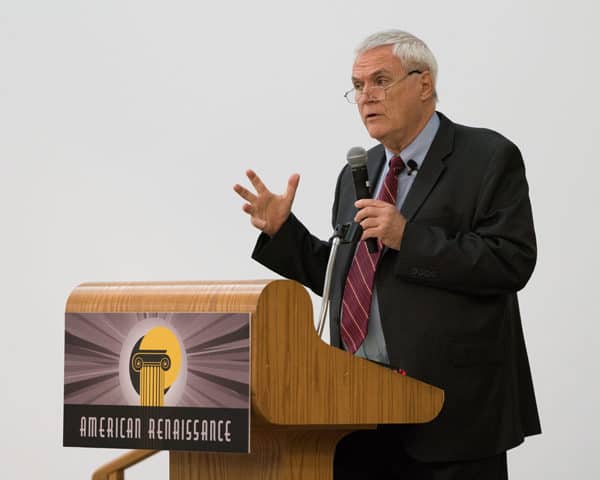
Sam Dickson
Mr. Dickson suggested no revolution has ever taken place without a split within the ruling elites and that white advocates must state their ideas in such a way as to create that split. He argued the existing system offers no hope of salvation and that white advocates should work for the day when a healthier system can be created.
Mr. Dickson marveled at the way our opponents base their ideology on “dreams.” This has progressed to the philosophy of “post-positivism,” which puts theory over reality and in some cases dismisses reality altogether. Referring to how the media offered a false account of events in Charlottesville or cases such as the Trayvon Martin affair, he accused mainstream reporters of not just concocting “fake news,” but lying. He also noted how self-styled progressives have flip-flopped. They no longer care about the military-industrial complex, free speech, American workers, or opposition to war.
The opponents of white people, said Mr. Dickson, must believe contradictory and nonsensical things. These include believing that race doesn’t exist, that evolution stopped working on humans, and that there is no difference between men and women. They must believe that admitting race exists leads to genocide, but that Stalin’s gulags and Pol Pot’s killing fields cannot be laid at the door of egalitarianism. They must believe America has the right to overthrow governments all over the world, but that it is a crime if a Russian speaks to an American about an election.
We, said Mr. Dickson, are not capable of such stupidity or dishonesty. Nor can we deny our heritage and history. “I cannot cease to be what I am,” he said. “I cannot cease to be a white man. I don’t have that choice. And you don’t either.” Echoing Luther, Mr. Dickson concluded: “Here we stand. We can do no other.”
Indeed, we can do no other. If last year’s conference was marked by exaltation, this year’s was marked by determination. During breaks, the hall was filled with talk of strategy, tactics, concrete plans, and specific goals. But there was more. As one attendee put it, “This wasn’t just an enjoyable time, it felt like one of the most deeply significant experiences of my life.” It was a triumph that felt like a precursor to something even greater.
We have already contracted to return to Montgomery Bell State Park next year. If you missed this year’s conference, mark your calendar: May 17 through 19, 2019. We’ll see you then.















